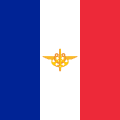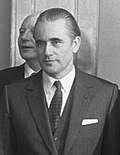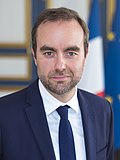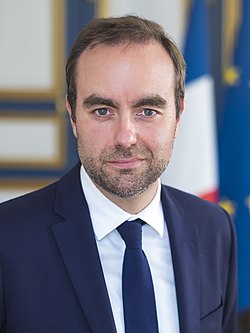Minister of the Armed Forces (France)
Member of the Government of France From Wikipedia, the free encyclopedia
The Minister of the Armed Forces (French: Ministre des Armées, lit. 'Minister of the Armies') is the leader and most senior official of the French Ministry of the Armed Forces, tasked with running the French Armed Forces. The minister is the third-highest civilian[1] having authority over France's military, behind the President of the Republic[2] and the Prime Minister.[3] Based on the governments, they may be assisted by a minister or state secretary for veterans' affairs.
| Minister of the Armed Forces | |
|---|---|
| Ministre des Armées (French) | |
 Honor flag and naval jack of the minister | |
| Ministry of the Armed Forces | |
| Member of | Government
|
| Reports to | |
| Seat | |
| Nominator | Prime Minister |
| Appointer | President |
| Term length | No fixed term |
| Precursor | |
| Formation | 21 November 1945 |
| First holder | Edmond Michelet |
| Deputy | |
| Salary | 10,135€ per month |
| Website | www.defense.gouv.fr |
The office is considered to be one of the core positions of the Government of France. Since 20 May 2022, the Minister of the Armed Forces has been Sébastien Lecornu, the 45th person to hold the office.
History
The minister in charge of the Armed Forces has evolved within the epoque and regimes. The Secretary of State of War was one of the four specialised secretaries of state established in France in 1589. This State Secretary was responsible for the French Army (similarly, the Naval Ministers of France and the Colonies was created in 1669). In 1791, the Secretary of State of War became Minister of War, with this ministerial function being abolished in 1794 and re-established in 1795. Since 1930, the position was often referred to as Minister of War and National Defence. In 1947, two years after World War II, the ministry merged with the Ministry of the Navy and the Ministry of Air (created in 1930), while being headed by a Minister of National Defence responsible for the French Armed Forces, often referred to as Minister of the Armies and since 1947 until 2017, designated as Minister of Defence.
Powers and functions
As the head of the military, the minister is part of the Council of Defence.[4] In addition to their authority over the armed forces, the minister also heads the external and military intelligence community.[1] In this capacity, they are also a member of the National Council of Intelligence.[5]
Although the Minister of the Armed Forces is the official responsible for veterans affairs,[6] they usually delegate their powers to a dedicated subordinate minister or state secretary.
The direct military subordinates of the minister are the:[7]
- Chief of the Defence Staff
- Delegate General for the Armament
- Secretary General for the Administration
Officeholders
Provisional Government
| No. | Portrait | Name | Term | Government | President | Ref. | |||
|---|---|---|---|---|---|---|---|---|---|
| Took office | Left office | Time in office | |||||||
| Ministry established | |||||||||
| |||||||||
| 1 |  |
Edmond Michelet | 21 November 1945 | 16 December 1946 | 1 year, 25 days |
|
[8] | ||
| Serving with Minister of National Defence, Charles de Gaulle | |||||||||
| |||||||||
| 2 |  |
André Le Troquer | 16 December 1946 | 22 January 1947 | 37 days | Blum III | Léon Blum | [9] | |
Fourth Republic
| No. | Portrait | Name | Term | Government | President | Ref. | |||
|---|---|---|---|---|---|---|---|---|---|
| Took office | Left office | Time in office | |||||||
| |||||||||
| 3 |  |
François Billoux | 22 January 1947 | 4 May 1947 | 102 days | Ramadier I | Vincent Auriol | [10] | |
| Serving with: War Minister Paul Coste-Floret; Navy Minister Louis Jacquinot; Air Minister André Maroselli | |||||||||
| Interim by Yvon Delbos, Minister of State, from 4 May 1947 to 22 October 1947. | [11] | ||||||||
| |||||||||
| 4 |  |
Pierre-Henri Teitgen | 22 October 1947 | 26 July 1948 | 278 days |
|
Vincent Auriol | [13] | |
| |||||||||
| 5 |  |
René Mayer | 26 July 1948 | 11 September 1948 | 47 days |
|
Vincent Auriol | [14] | |
| 6 |  |
Paul Ramadier | 11 September 1948 | 28 October 1949 | 1 year, 47 days | Queuille I | [15] | ||
| 7 |  |
René Pleven | 28 October 1949 | 12 July 1950 | 257 days |
|
[16] | ||
| 8 |  |
Jules Moch | 12 July 1950 | 11 August 1951 | 1 year, 30 days |
|
[17] | ||
| 9 |  |
Georges Bidault | 11 August 1951 | 8 March 1952 | 210 days |
|
[18] | ||
| 10 |  |
René Pleven | 8 March 1952 | 19 June 1954 | 2 years, 103 days |
|
[19] | ||
| René Coty | |||||||||
| |||||||||
| 11 |  |
Pierre Kœnig | 19 June 1954 | 14 August 1954 | 56 days | Mendès-France | René Coty | [20] | |
| Interim by Emmanuel Temple, Minister of Veterans and War Victims, from 14 August 1954 to 3 September 1954. | [21] | ||||||||
| 12 |  |
Emmanuel Temple | 3 September 1954 | 20 January 1955 | 139 days | Mendès-France | René Coty | [22] | |
| |||||||||
| 13 |  |
Maurice Bourgès-Maunoury | 20 January 1955 | 23 February 1955 | 34 days | Mendès-France | René Coty | [23] | |
| Serving with Minister of National Defence, Jacques Chevallier | |||||||||
| |||||||||
| 14 |  |
Pierre Kœnig | 23 February 1955 | 6 October 1955 | 225 days | Faure II | René Coty | [24] | |
| 15 |  |
Pierre Billotte | 6 October 1955 | 1 February 1956 | 118 days | [25] | |||
| 16 |  |
Maurice Bourgès-Maunoury | 1 February 1956 | 13 June 1957 | 1 year, 132 days | Mollet | [26] | ||
| 17 |  |
André Morice | 13 June 1957 | 6 November 1957 | 146 days | Bourgès-Maunoury | [27] | ||
| 18 |  |
Jacques Chaban-Delmas | 6 November 1957 | 14 May 1958 | 189 days | Gaillard | [28] | ||
| 19 |  |
Pierre de Chevigné | 14 May 1958 | 1 June 1958 | 18 days | Pflimlin | [29] | ||
| |||||||||
| 20 |  |
Pierre Guillaumat | 1 June 1958 | 8 January 1959 | 221 days | de Gaulle III | René Coty | [30] | |
| Serving with Minister of National Defence, Charles de Gaulle | |||||||||
Fifth Republic
| No. | Portrait | Name | Term | Government | President | Ref. | |||
|---|---|---|---|---|---|---|---|---|---|
| Took office | Left office | Time in office | |||||||
| |||||||||
| 21 |  |
Pierre Guillaumat | 8 January 1959 | 5 February 1960 | 1 year, 28 days | Debré | Charles de Gaulle | [31] | |
| 22 |  |
Pierre Messmer | 5 February 1960 | 22 June 1969 | 9 years, 137 days |
|
[32] | ||
| Interim : Alain Poher | |||||||||
| |||||||||
| 23 |  |
Michel Debré | 22 June 1969 | 5 April 1973 | 3 years, 287 days |
|
Georges Pompidou | [33] | |
| |||||||||
| 24 |  |
Robert Galley | 5 April 1973 | 28 May 1974 | 1 year, 53 days | Messmer II–III | [34] | ||
| |||||||||
| 25 |  |
Jacques Soufflet | 28 May 1974 | 31 January 1975 | 248 days | Chirac I | Valéry Giscard d'Estaing | [35] | |
| 26 |  |
Yvon Bourges | 31 January 1975 | 2 October 1980 | 5 years, 245 days |
|
[36] | ||
| 27 |  |
Joël Le Theule | 2 October 1980 | 22 December 1980 | 81 days | Barre III | [37] | ||
| 28 |  |
Robert Galley | 22 December 1980 | 22 May 1981 | 151 days | [38] | |||
| 29 |  |
Charles Hernu | 22 May 1981 | 20 September 1985 | 4 years, 121 days |
|
François Mitterrand | [39] | |
| 30 |  |
Paul Quilès | 20 September 1985 | 20 March 1986 | 181 days | Fabius | [40] | ||
| 31 |  |
André Giraud | 20 March 1986 | 12 May 1988 | 2 years, 53 days | Chirac II | [41] | ||
| 32 |  |
Jean-Pierre Chevènement | 12 May 1988 | 29 January 1991 | 2 years, 262 days | Rocard I–II | [42] | ||
| 33 |  |
Pierre Joxe | 29 January 1991 | 9 March 1993 | 2 years, 39 days |
|
[43] | ||
| 34 |  |
Pierre Bérégovoy | 9 March 1993 | 30 March 1993 | 21 days | Bérégovoy | [44] | ||
| 35 |  |
François Léotard | 30 March 1993 | 18 May 1995 | 2 years, 49 days | Balladur | [45] | ||
| 36 |  |
Charles Millon | 18 May 1995 | 4 June 1997 | 2 years, 17 days | Juppé I–II | Jacques Chirac | [46] | |
| 37 |  |
Alain Richard | 4 June 1997 | 7 May 2002 | 4 years, 337 days | Jospin | [47] | ||
| 38 |  |
Michèle Alliot-Marie | 7 May 2002 | 18 May 2007 | 5 years, 11 days |
|
|||
| 39 |  |
Hervé Morin | 18 May 2007 | 14 November 2010 | 3 years, 180 days | Fillon I–II | Nicolas Sarkozy | ||
| |||||||||
| 40 |  |
Alain Juppé | 14 November 2010 | 27 February 2011 | 105 days | Fillon III | Nicolas Sarkozy | ||
| 41 |  |
Gérard Longuet | 27 February 2011 | 16 May 2012 | 1 year, 79 days | ||||
| |||||||||
| 42 |  |
Jean-Yves Le Drian | 16 May 2012 | 17 May 2017 | 5 years, 1 day | François Hollande | |||
| |||||||||
| 43 |  |
Sylvie Goulard | 17 May 2017 | 21 June 2017 | 35 days | Philippe I | Emmanuel Macron | ||
| 44 |  |
Florence Parly | 21 June 2017 | 20 May 2022 | 4 years, 333 days | ||||
| 45 |  |
Sébastien Lecornu | 20 May 2022 | Incumbent | 2 years, 346 days | ||||
See also
References
Wikiwand - on
Seamless Wikipedia browsing. On steroids.

